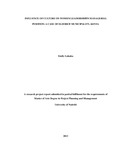| dc.description.abstract | Women Play an important role in society as procreators of the coming generation,
as well as producers of goods and services. In the modern economies they are playing an
important role in the labour force. The study objectives were; to establish the effect of
gender inequality on progression and participation of women in management; to
determine how family chores affect women’s participation in management, to identify the
effect of gender stereotyping on progression and participation of women in management
and to establish effect of inadequate women empowerment on progression and
participation of women in management. The study employed a descriptive survey
research design because it describes and explains the events as they are in the real life
context in which they occurred and it was suitable for this study because it was able to
appropriately capture the required data within the specified time for the study and will
provide the required data more quickly and enable the gathering and analysis of the
relevant information. The study was limited to respondents in Eldoret town. The study
purposively selected 58 respondents this is because purposive sampling research design
provides equal chances to every sample of a given size in the accessible population. Data
was collected using questionnaires because it is cheap to administer since it does not
require a trained researcher to distribute and collect the questionnaires, it eliminates
interaction between the interviewer and the respondents which reduces biases and
moreover, the person filling the questionnaire is anonymous and therefore may be willing
to give information especially over sensitive issues. It is also a useful method
particularly when the questions are straightforward enough to be comprehended without
verbal explanation. Data was analyzed descriptively. Descriptive statistic such as mean
and standard deviation was computed to give the differences in responses. Data was
presented in frequency tables. The study is expected to contribute positively to the
women improvement in the leadership positions and gender balance in our community
and promote the newly enacted constitution. The researcher concluded that, women are
highly discriminated at place of work and there is a high level of gender inequalities
when it comes to promotion and employment. | en |

